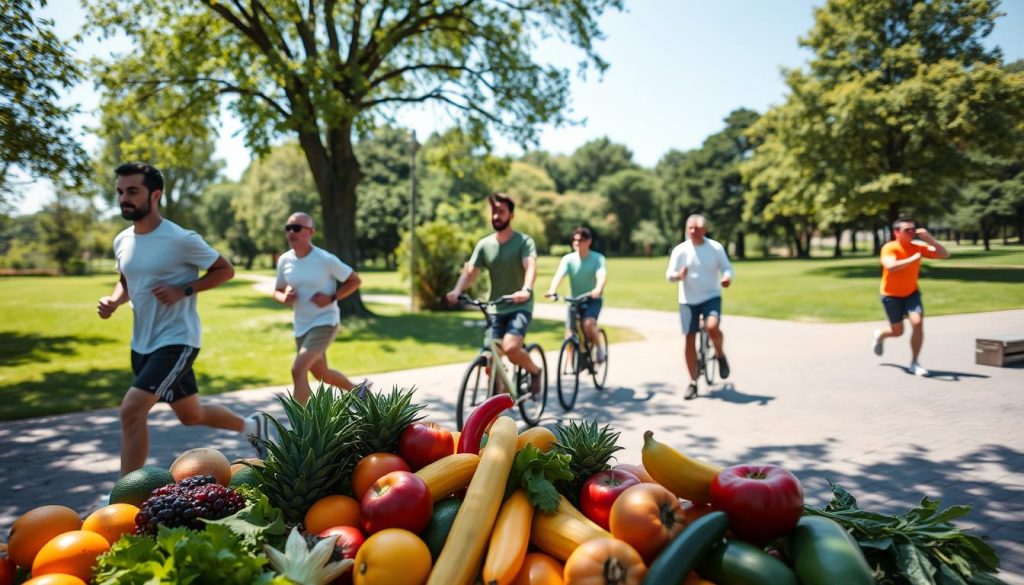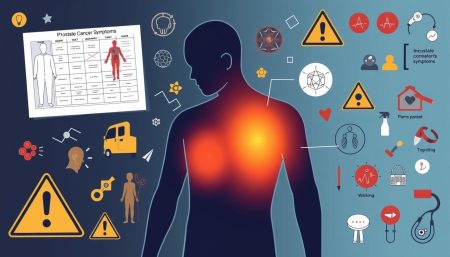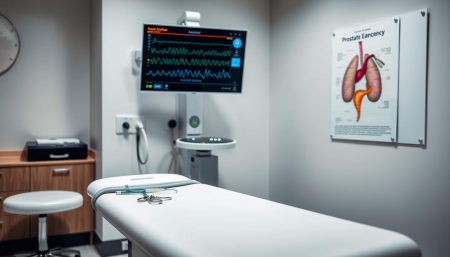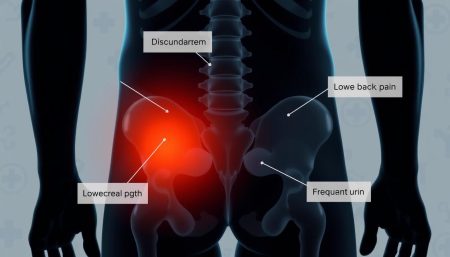Prostate cancer is a big worry for men everywhere. This guide will show you how to lower your risk. We’ll look at proven ways, lifestyle changes, and early detection methods to help keep your prostate healthy.
We’ll talk about diet, nutrition, and screening options. This info will help you take charge of your prostate health. By knowing the risks and making smart lifestyle choices, you can reduce your chance of getting prostate cancer.
Understanding Prostate Cancer Risk Factors and Early Warning Signs
It’s important to know the risk factors and early signs of prostate cancer. This knowledge helps men protect themselves. It’s a step towards better health.
Genetic and Family History Considerations
Your genes are a big part of your risk for prostate cancer. If your family has a history of it, you might be at higher risk too. Talking about your family’s health with your doctor is key.
Age-Related Risk Factors
Age is a major factor in prostate cancer risk. The older you get, the higher your risk. Most cases are found in men over 50, with a sharp increase after 65. Regular health checks are vital as you age.
Common Early Warning Symptoms
Spotting symptoms early is the first step in finding prostate cancer. Look out for:
- Frequent urination, especially at night
- Difficulty starting or stopping urination
- Weak or interrupted urine flow
- Blood in urine or semen
- Discomfort in the pelvic area
If you notice these signs, don’t worry yet. But do see your doctor. They might not be cancer, but they need checking. Finding cancer early can greatly improve treatment chances.
How to Protect From Prostate Cancer Through Diet and Nutrition
Eating right is key to preventing prostate cancer. By choosing the right foods, you can keep your prostate healthy and lower your cancer risk.
Cancer-Fighting Foods and Supplements
Adding cancer-fighting foods to your diet is important. Tomatoes, full of lycopene, are a great choice. Broccoli and cauliflower, rich in compounds that slow cancer, are also good. Green tea and pomegranate juice are beneficial too. Taking vitamin D and selenium supplements can also help your prostate.

Foods to Avoid for Prostate Health
Some foods might raise your prostate cancer risk. Cut down on red meat and dairy. Avoid processed foods with lots of saturated fats. Drink alcohol in small amounts. These tips can guide you to better food choices.
Importance of Antioxidants and Omega-3s
Antioxidants and omega-3s are vital for prostate health. Berries, nuts, and leafy greens are full of antioxidants. Omega-3s are found in fatty fish like salmon. These nutrients fight inflammation and support prostate function.
| Beneficial Foods | Foods to Limit |
|---|---|
| Tomatoes | Red Meat |
| Broccoli | Dairy Products |
| Green Tea | Processed Foods |
| Salmon | Alcohol |
Essential Lifestyle Changes for Prostate Health
Improving your prostate health starts with making good lifestyle choices. Regular exercise is a big help in lowering prostate cancer risk. Men who are active tend to have less aggressive prostate cancer.
Try to do at least 30 minutes of moderate exercise every day, five days a week. Activities like brisk walking, swimming, or cycling are great. Strength training helps keep hormones balanced, which is key for your prostate.
Managing stress is also crucial. Too much stress can weaken your immune system and raise cancer risk. Here are some ways to relax:
- Deep breathing exercises
- Meditation or mindfulness practices
- Yoga or tai chi
- Spending time in nature
Keeping a healthy weight is also important. Being overweight can increase the risk of aggressive prostate cancer. Eating well and exercising regularly can help you stay at a healthy weight.
Lastly, getting enough sleep is vital. Aim for 7-9 hours of sleep each night. Good sleep helps regulate hormones and boosts your immune system, both important for prostate health.
By making these lifestyle changes, you’re taking steps to lower your prostate cancer risk and improve your health.
Prostate Cancer Screening and Early Detection Methods
Screening for prostate cancer is vital for catching it early. Regular tests can find the disease when it’s still treatable. Let’s look at the ways to screen and detect prostate cancer.
PSA Testing Guidelines
PSA (Prostate-Specific Antigen) testing is a key tool for screening. It checks PSA levels in blood, which can signal cancer. Guidelines suggest testing for men aged 50-70, with adjustments for risk factors.
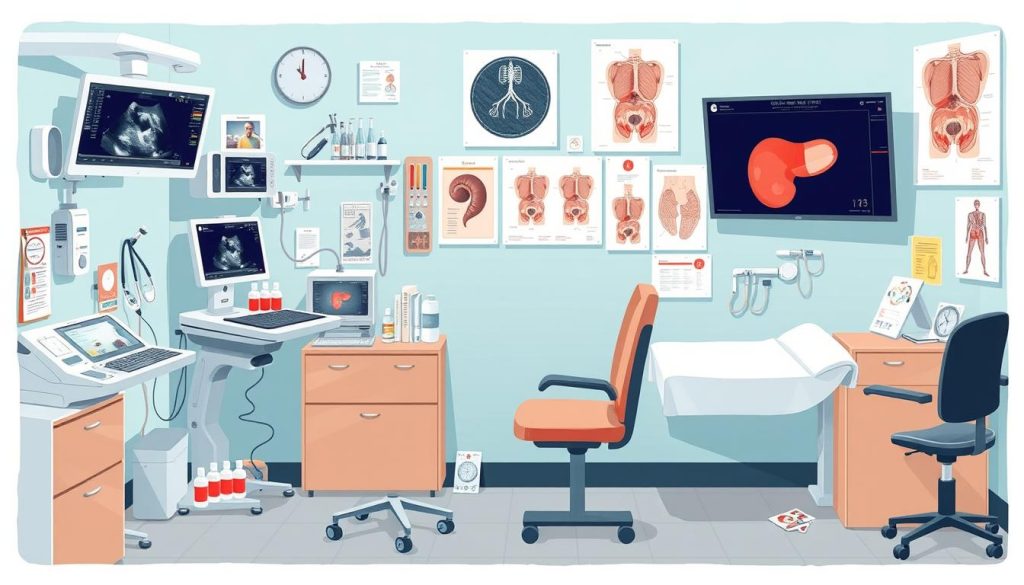
Digital Rectal Examination (DRE)
DRE is a physical exam that checks the prostate for problems. It’s not as sensitive as PSA testing but can find issues PSA might miss. Doctors often do DRE with PSA testing for a full check.
When to Start Regular Screenings
The right age for starting screenings varies by risk. Men with a family history or African Americans might start at 45. Talk to your doctor about your risk to set the best screening plan.
Modern Diagnostic Technologies
New medical tech has made finding prostate cancer more accurate. Tools like MRI and PET scans give clear images of the prostate. These help doctors spot cancer early, alongside traditional tests.
Early detection of prostate cancer is crucial for better treatment. Regular screenings are essential for keeping your prostate healthy.
Natural and Alternative Prevention Strategies
Using natural remedies for prostate health is key to lowering prostate cancer risk. Many men choose holistic methods to go along with medical care. These methods aim for overall wellness and can help beyond just prostate health.
Diet is very important for prostate health. Eating foods high in antioxidants and omega-3 fatty helps the prostate. Good foods include:
- Tomatoes and tomato products
- Green tea
- Cruciferous vegetables like broccoli and cauliflower
- Fatty fish such as salmon and mackerel
Regular exercise is also crucial. Try to do at least 30 minutes of moderate activity daily. Activities like brisk walking, swimming, or cycling are great.
Stress management, like meditation and yoga, can also help. These practices lower inflammation and boost the immune system.
| Natural Remedy | Potential Benefits |
|---|---|
| Saw Palmetto | May help with urinary symptoms |
| Lycopene | Powerful antioxidant found in tomatoes |
| Selenium | Supports immune function |
| Vitamin D | May reduce cancer cell growth |
Even though natural methods seem promising, always talk to a healthcare provider first. They can tailor a plan that mixes traditional and alternative methods for the best prostate health.
Conclusion: Empowering Your Prostate Health Journey
Your prostate health is crucial for your overall well-being. Learning how to protect against prostate cancer is a big step towards a healthier life. Small changes in diet, exercise, and lifestyle can greatly reduce your risk.
Regular screenings are essential for catching issues early. Don’t hesitate to talk to your doctor about your concerns. They can help you find the right screening schedule based on your age and risk factors. Early detection often means better outcomes, just like with colon cancer symptoms and other health issues.
Take a proactive approach to your prostate health. Add cancer-fighting foods to your meals, stay active, and manage stress. These actions not only help prevent prostate cancer but also improve your overall health. You have the power to make positive changes. Start your journey to better prostate health today!
FAQ
Q: What are the main risk factors for prostate cancer?
A: Main risk factors for prostate cancer include age and family history. Genetic factors like BRCA1 and BRCA2 mutations also play a role. African American men are at higher risk. Diet, obesity, and certain chemicals may also affect risk.
Q: How can I reduce my risk of developing prostate cancer through diet?
A: Eat foods rich in antioxidants like berries and leafy greens. Include omega-3 fatty acids from fish or plants. Green tea and soy products are also good. Limit red meat and dairy, and avoid processed foods.
Q: What lifestyle changes can help protect against prostate cancer?
A: Stay healthy by maintaining a good weight and exercising daily. Quit smoking and drink less alcohol. Manage stress with meditation or yoga. These habits help your prostate and overall health.
Q: When should I start getting screened for prostate cancer?
A: Talk to your doctor about screening at age 50 if you’re at average risk. African American men and those with a family history should discuss it at 45. Always make screening decisions with your doctor.
Q: What are the early warning signs of prostate cancer?
A: Look out for trouble urinating, weak flow, and frequent nighttime urination. Blood in urine or semen, erectile issues, and pelvic pain are also signs. Remember, these can also mean other health issues, so see a doctor.
Q: Are there natural remedies that can help maintain prostate health?
A: Natural options like saw palmetto and pygeum may help. Foods rich in lycopene and zinc are also beneficial. Always check with a healthcare provider before starting any supplements.
Q: How effective is PSA testing in detecting prostate cancer?
A: PSA testing is useful but not perfect. It can find cancer early but may lead to false positives. Use it with other tests and get a doctor’s interpretation.
Q: Can exercise really help prevent prostate cancer?
A: Yes, exercise is key in preventing prostate cancer. It helps keep weight off, boosts immunity, and may affect hormone levels. Aim for 30 minutes of moderate activity daily.












